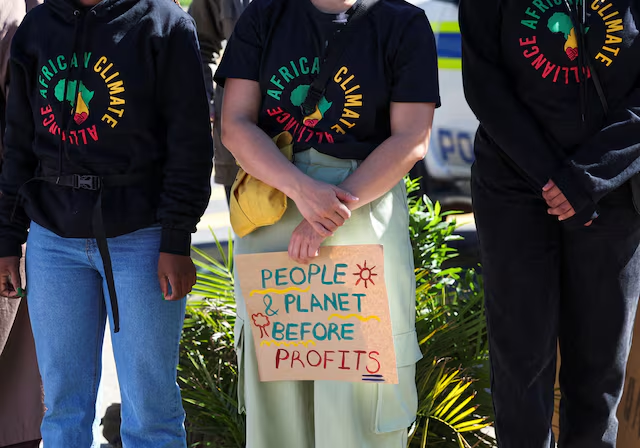
JOHANNESBURG, Nov 15 (Reuters) – South Africa’s revised carbon tax aims to balance the rival demands of climate activists and polluters by lowering tax-free allowances while letting companies make greater use of offsets, the Treasury’s acting tax chief said on Friday.
The changes, to come into effect in 2026, will help South Africa meet climate commitments but give ‘hard-to-abate’ sectors more flexibility, said Chris Axelson, Acting Head of Tax and Financial Sector Policy at the Treasury.
South Africa is one of the world’s top 15 greenhouse gas emitters and the only country in Africa with a carbon tax.
“It definitely is a change to the previous structure (in which)…the offsets were quite a small percentage,” Axelson told Reuters in a videocall interview.
At COP29 talks in Azerbaijan, developing countries pressured their richer counterparts for up to $1 trillion in climate finance to help nations historically least responsible for the crisis to shift to greener energy and adapt.
A Treasury policy paper released on Wednesday shows the offset allowance for combustion emissions going up to 25%, from 10%, after 2026. But this is counterbalanced by slashing tax-free allowances from 60% currently to half in 2026, and by a further 2.5 percentage points annually until 2030.
South Africa enacted its carbon tax in May 2019 after nearly a decade of shelving it over objections from mining companies, steelmakers and state-owned power utility, Eskom. Since then, industry has complained the tax is too onerous while climate activists decry it as too generous.
“We’re in a place where they’re all shouting at us,” Axelson said. “We’re trying to find that balance … We don’t want one side to say, ‘well, you’re hurting us too much’ and the other side to say, ‘well, you aren’t doing enough’.”
The proposal also replaces a 3.5 cent per kilowatt levy on non-renewable power with the carbon tax, which Axelson said would encourage Eskom – whose overreliance on coal has made South Africa a bigger emitter than Britain or France – to use renewables but “but without the potential of passing on costs to the consumers.”
(Reporting by Tim Cocks; Editing by Christina Fincher)

